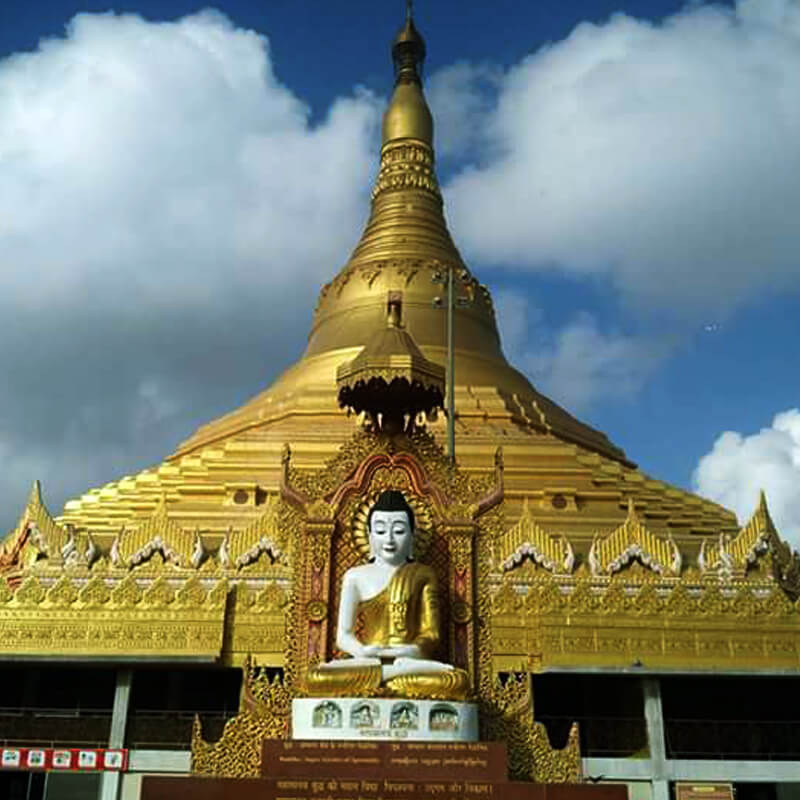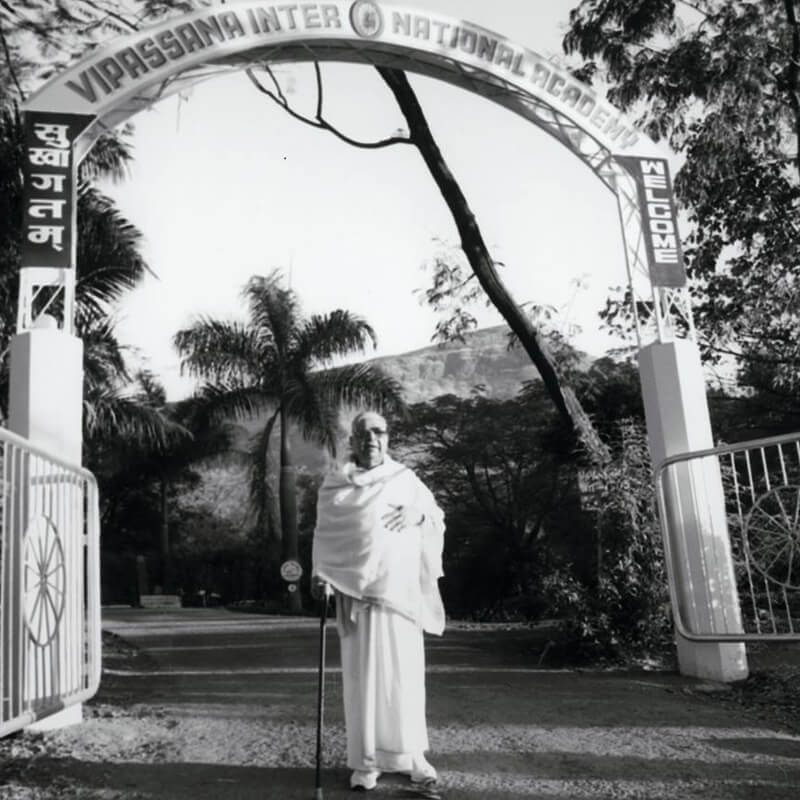(This is the concluding part of the report on Goenkaji’s stay in Myanmar in December 2004 and January 2005.)
On 27 January 2005, Goenkaji spoke about sammā samādhi (right concentration) and about the importance of natural breath as the object of concentration. There are many objects with the help of which one can concentrate the mind. The Buddha gave forty such objects of concentration but he mainly taught ānāpāna-sati—observation of the natural respiration, as it is.
The Buddha described sammā-samādhi as kusala cittassa ekaggatā. One is practising proper samādhi when one concentrates on respiration, without craving and aversion; that is, with a pure mind. Goenkaji then explained how one embarks upon a step-by-step journey of self-exploration during a ten-day Vipassana course.
On 28 January, Goenkaji gave a talk in the morning at the International Theravada Buddhist Missionary University. The peaceful campus with its many trees, shaded pathways, magnificent buildings and dedicated students—mostly monks and nuns from diverse traditions—brings sublime delight to anyone who goes there.
Goenkaji spoke about how he was attracted to the Buddha’s teaching. Explaining the importance of vedanā (sensations), he said that so long as one is not aware of sensations, one keeps thinking that the outside objects are responsible for craving and aversion. One thinks, “This is desirable” or “This is not desirable”. For example, an alcoholic thinks that he is addicted to alcohol. He is actually addicted to the sensations that he feels when he drinks alcohol. But one is not merely addicted to alcohol; one is addicted to various defilements such as anger, hatred, fear, and lust.
If one keeps on reacting blindly to pleasant and unpleasant sensations, one generates saṅkhāras (mental volitional actions) of craving (lobha) and aversion (dosa); one thereby multiplies one’s misery. If one learns to maintain equanimity in the face of pleasant and unpleasant sensations, one starts changing the habit pattern at the deepest level of mind and starts coming out of misery.
The sensations are the root. As long as one neglects the roots, the poisonous tree will grow again even if the trunk is cut down. The Buddha said that just as a tree with roots intact and secure, though cut down, sprouts again; even so while latent craving is not rooted out, misery springs up again and again.
Thus, this super-scientist discovered that to become fully liberated from mental defilements, one has to work at the root of the mind. One must cut asunder the roots of taṇhānusaya (latent craving).
By developing understanding of the impermanent nature of sensations, one develops paññā (wisdom) in response to sensations. When one observes sensations in this manner, one starts coming out of ignorance and understands the law of nature. The Buddha called this dhamma-niyāmatā.
Goenkaji emphasized the universal nature of Dhamma and said that the practice of morality, the development of a disciplined mind and the development of a pure mind are common to all religions and hence acceptable to all religions. “Purity of mind is the greatest common denominator of all religions,” Sayagyi U Ba Khin used to say. The practice of Vipassana is the way to purify the mind.
At the end of the talk, Goenkaji advised the students of the university (many of whom would probably be travelling around the world to teach Dhamma) that they should never condemn other religions or other traditions. Goenkaji said that he had learned this from his teacher Sayagyi and quoted from an edict carved on a rock pillar by the great Indian emperor Asoka:
“One should not honour only one’s own religion and condemn other faiths. Instead one should honour other religions for various reasons. By so doing one helps one’s own religion to grow, and also renders service to the religions of others. In acting otherwise, one digs the grave of one’s own religion, and harms other religions as well. Someone who honours his own religion and condemns other religions, may do so out of devotion to his religion thinking ‘I will glorify my religion,’ but his actions injure his own religion more gravely.”
Goenkaji added that the specialty of the Buddha’s teaching is that it is practical. Therefore, the students should make sure that they don’t ignore the practical aspect of Dhamma while studying its theoretical aspect.
In the evening, delivering the third lecture of the series, Goenkaji spoke about paññā (purifying wisdom). He explained how it was a great discovery of Buddha that one generates taṇhā (craving) in response to vedanā (sensations). The Buddha discovered that whatever arises in the mind is accompanied by sensations on the body—vedanāsamosaraṇā sabbe dhammā. Every thought that arises in the mind is accompanied by a sensation on the body. Therefore, when one is working with sensations, one is working at the depth of the mind.
It is unfortunate that different religions have become so compartmentalized and intolerant, creating untold strife and violence. Goenkaji explained that the Buddha’s teaching always brings people together. Dhamma never divides people; Dhamma unites them. Therefore, Dhamma has an important role to play in bringing peace to the world.
Goenkaji said that he firmly believes that Myanmar will be a fountainhead of Dhamma and that the Global Pagoda in India will be a lighthouse of Dhamma during the Second Buddha Sāsana.
On the evening of 29 January, Goenkaji spoke in Hindi to the expatriate Indians at the Panchayati Wadi Dharamshala in downtown Yangon. He said that all Indians are proud of their ancient heritage of spirituality. He advised them to use intellect and logic in judging any spiritual tradition. Goenkaji explained the true meaning of the word “Dharma”. The term Bauddha Dharmawas not used until about five hundred years after the Buddha; the term Hindu Dharma originated much later. This shows that in ancient India, Dharma was used in its real meaning by all traditions. Dharma means law: the law of nature, the law of cause and effect; the relationship of mind and matter.
Goenkaji said that nature gives immediate results: the moment one’s mind is defiled, one becomes miserable and the moment one’s mind is pure, one is filled with mettā (loving kindness), karuṇā (compassion), muditā (sympathetic joy) and upekkhā(equanimity). One gets an immediate reward: one feels happy and peaceful.
In this detailed talk, Goenkaji touched upon all major areas of misconceptions about the Buddha: that the Buddha’s teaching is deceptive; that it is pessimistic; that it made India a weak country; that Asoka disbanded his army after he started following the Buddha’s teaching, and so on. He urged the expatriate Indians in Myanmar to understand the true teaching of the Buddha and to avoid making misinformed statements about the Buddha. Most importantly, he said, they should give a trial to Vipassana, the practical aspect of his teaching, in order to live a happier and more peaceful life.
As he walked out of the hall at the end of the talk—his last public engagement in Myanmar during this visit—Goenkaji chanted:
“Jisa dharatī ne janama diyā,
usa dharatī ko hama namana kareṅ;
jisa dharatī ne dharama diyā,
usa dharatī ko hama naman kareṅ…
To the land that gave me birth,
To that land I pay respect;
To the land that gave me Dhamma,
To that land I pay respect …
”
May the people of Myanmar be happy, peaceful and prosperous!
Ciram Tiṭṭhatu Saddhammo—May the true Dhamma endure for long!






